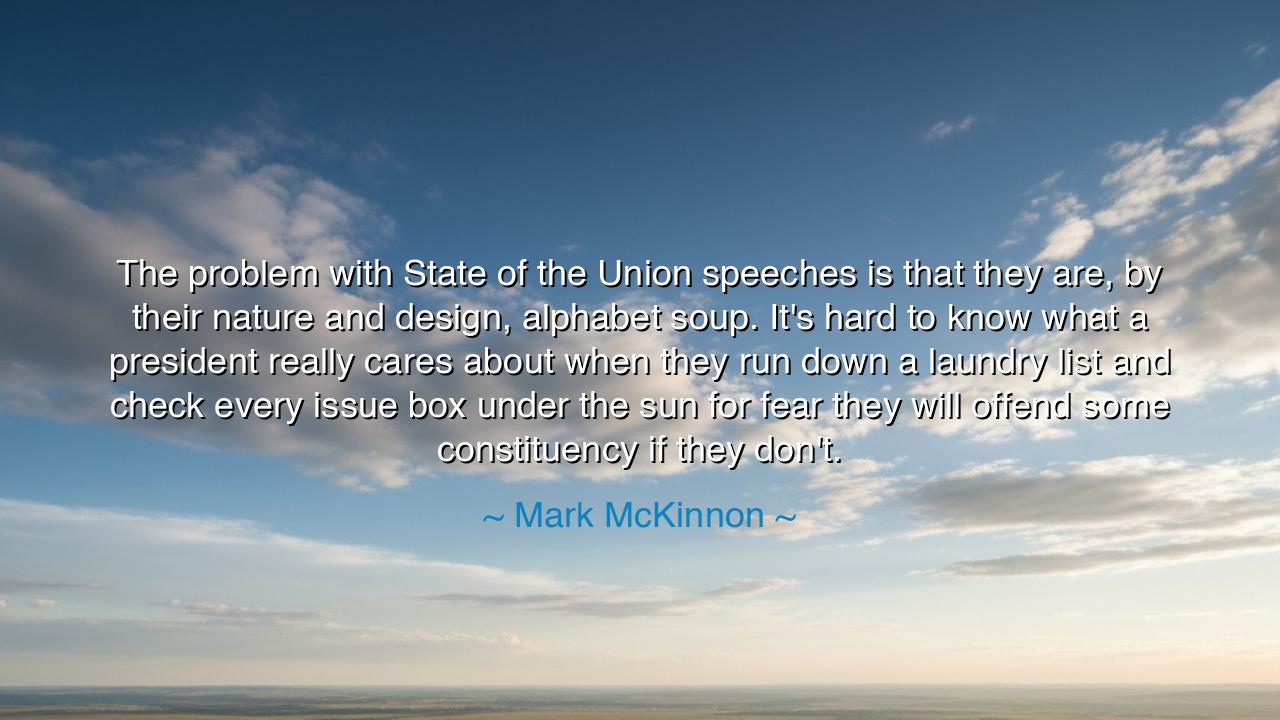
The problem with State of the Union speeches is that they are, by
The problem with State of the Union speeches is that they are, by their nature and design, alphabet soup. It's hard to know what a president really cares about when they run down a laundry list and check every issue box under the sun for fear they will offend some constituency if they don't.






“The problem with State of the Union speeches is that they are, by their nature and design, alphabet soup. It's hard to know what a president really cares about when they run down a laundry list and check every issue box under the sun for fear they will offend some constituency if they don't.” Thus spoke Mark McKinnon, a strategist and observer of politics, a man who has seen the machinery of power from within and without. In these words, he offers not only a critique of leaders but a reflection on the nature of communication, authenticity, and courage. For this quote is not truly about politics — it is about the human tendency to seek safety in pleasing everyone, and in doing so, to say nothing that truly matters.
When McKinnon speaks of “alphabet soup,” he paints a vivid image: a speech so filled with letters, phrases, and promises that it becomes incoherent — a mass of sound without soul. The State of the Union, once meant to be a declaration of purpose and conviction, has, in his view, become a ritual of appeasement. Every interest group, every cause, every corner of the nation must be named and flattered, lest silence be mistaken for neglect. Yet in this flood of words, the essence of truth is lost. For as the ancients knew, clarity is the soul of wisdom, and a leader’s worth is measured not by how many promises he makes, but by the single promise he keeps.
There is a long history of this tension between speaking to please and speaking with purpose. In the ancient Greek city-states, the orators of the agora were celebrated for their eloquence, but the wisest among them — such as Pericles — understood that true speech is not decoration, but action. When he addressed the Athenians in his Funeral Oration, he did not list every grievance or policy; he spoke instead of ideals — of courage, of freedom, of the immortal bond between citizen and city. His words stirred hearts for generations because they were not crafted to flatter, but to inspire. They rose not from calculation, but from conviction. This, McKinnon reminds us, is what modern leadership often forgets.
In his quote, McKinnon laments the fear that governs speech — the fear of offense, the fear of omission, the fear of losing approval. He reveals a truth that extends far beyond the podium of presidents: that fear is the enemy of authenticity. The one who tries to please all will serve none. The leader who speaks without conviction becomes like a reed in the wind — moving with every gust, but rooted nowhere. So it is with any person who sacrifices sincerity for acceptance. For though such a one may avoid conflict, they also avoid meaning.
There is an ancient proverb that says: “The lion does not apologize for its roar.” The lion roars not to charm, but to declare its presence and its truth. So too should those who lead, who teach, or who create. When one’s words arise from belief, they carry power; when they arise from calculation, they dissolve into noise. McKinnon’s “alphabet soup” is the language of fear — a thousand letters swirling, signifying nothing. But the language of courage is simple, direct, and alive. It is not afraid to offend, because it seeks not approval, but understanding.
Consider also the tale of Abraham Lincoln, whose speeches were not long, but enduring. The Gettysburg Address contained no exhaustive list of policies, no pandering to factions — yet it reshaped a nation’s soul. In a few sentences, he spoke to the heart of a people torn by war, and reminded them of their higher purpose. His words endured not because they pleased all, but because they spoke to truth. He, like Pericles, understood what McKinnon urges us to remember: that the power of speech lies not in its length, but in its clarity of spirit.
From McKinnon’s words we may learn this: that communication, whether in politics, art, or daily life, is an act of moral courage. The wise must resist the temptation to fill silence with noise, or truth with compromise. Speak less, but say what matters. Name not every cause to prove your care, but act with integrity toward the few that you can change. And above all, do not let fear of displeasing others steal your voice, for in seeking to avoid offense, you will lose your authenticity — and with it, your influence.
So, my child, when it is your turn to speak — whether to a nation or to a single soul — remember this teaching. Words are not meant to cover all things, but to reveal one thing clearly: your truth. Speak not as one seeking applause, but as one bearing fire. For the world has no need of more “alphabet soup,” but it thirsts for voices that dare to be sincere. Let your speech, then, be your act of courage — concise, honest, and full of conviction — so that those who hear you may not simply remember your words, but feel your purpose.






AAdministratorAdministrator
Welcome, honored guests. Please leave a comment, we will respond soon